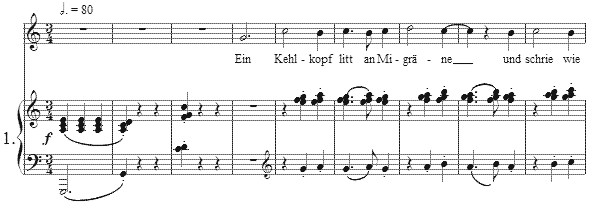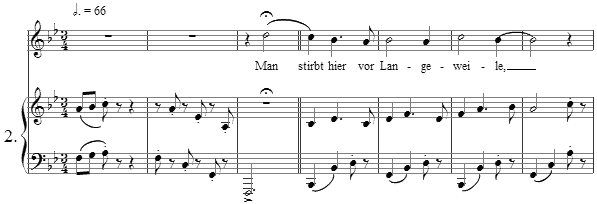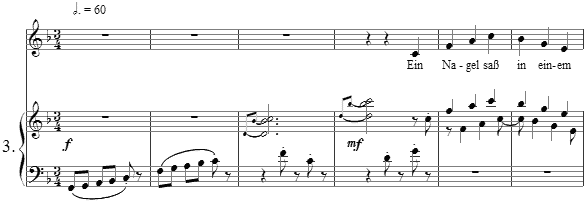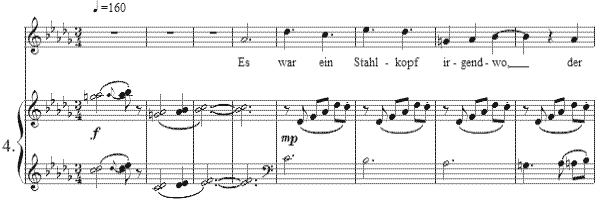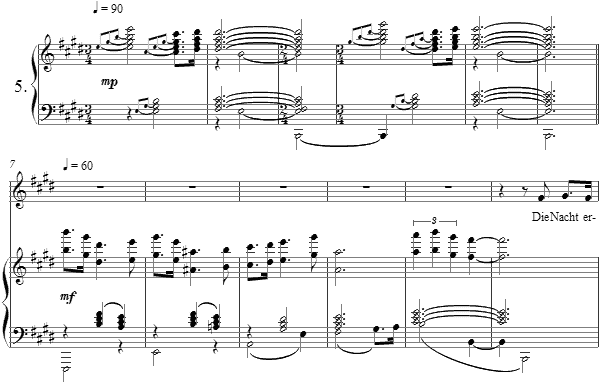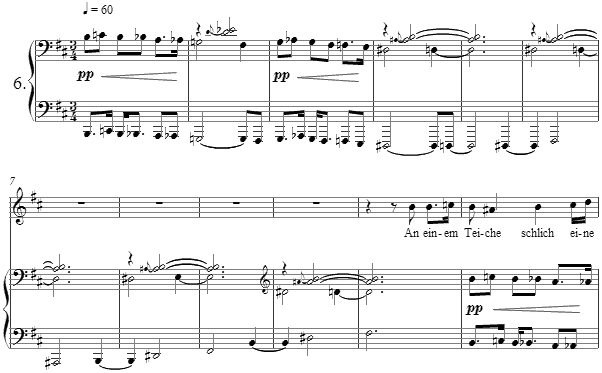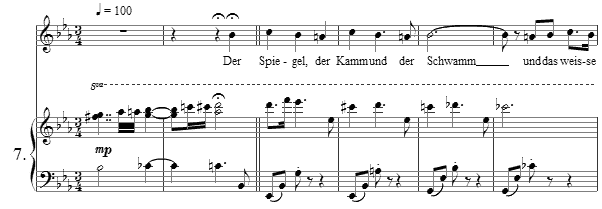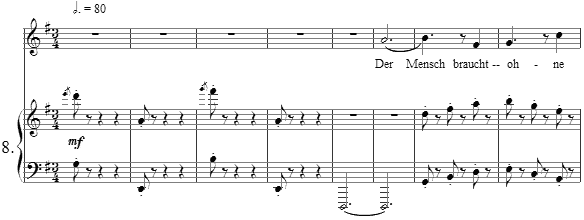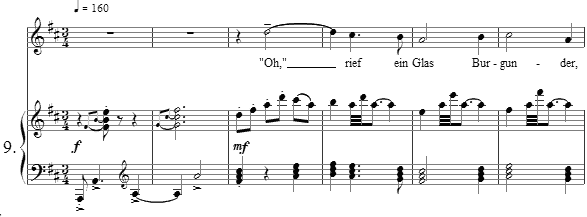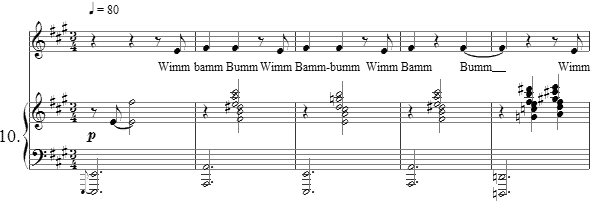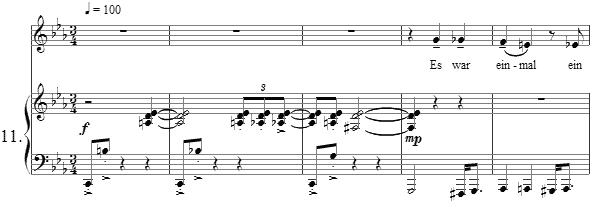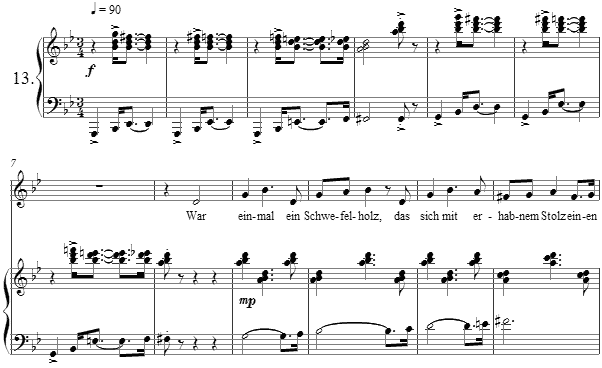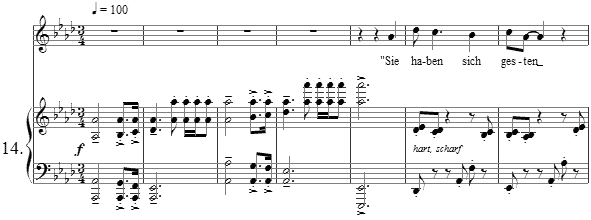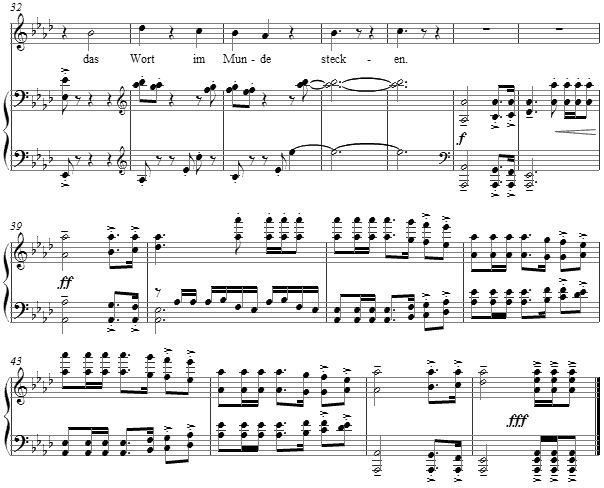Music and Texts of GARY BACHLUND
Vocal Music | Piano | Organ | Chamber Music | Orchestral | Articles and Commentary | Poems and Stories | Miscellany | FAQs
Ringelnatz in dreiviertel Takt - (2009)
Joachim Ringelnatz
fourteen songs for medium voice and piano
Vierzehn Lieder
i. Ein Kehlkopf
Ein Kehlkopf litt an Migräne
Und schrie wie eine Hyäne,
Er schrie sich wund.
Doch als ihm niemand zu Hilfe kam
Und niemand sein Geschrei vernahm,
War er auf einmal – – gesund.[ 1 page, circa 30" ]
ii. Beim Mittagessen!
Man stirbt hier vor Langeweile,
Dachte die Nagelfeile
Beim Mittagessen!
Und machte sich, wie von ungefähr,
Über den Fingernagel her,
Beim Mittagessen!
Da begann eine silberne Gabel zu schrei'n:
"Meine Dame – – Sie sind hier nicht allein!"[ 2 pages, circa 50" ]
iii. Ein Nagel saß in einem Stück Holz
Ein Nagel saß in einem Stück Holz.
Der war auf seine Gattin sehr stolz.
Die trug eine goldene Haube
Und war eine Messingschraube.
Sie war etwas locker und etwas verschraubt,
Sowohl in der Liebe, als auch überhaupt.
Sie liebte ein Häkchen und traf sich mit ihm
In einem Astloch. Sie wurden intim.
Kurz, eines Tages entfernten sie sich
Und liessen den armen Nagel im Stich.
Der arme Nagel bog sich vor Schmerz.
Noch niemals hatte sein eisernes Herz
So bittere Leiden gekostet.
Bald war er beinah verrostet.
Da aber kehrte sein früheres Glück,
Die alte Schraube wieder zurück.
Sie glänzte übers ganze Gesicht.
Ja, alte Liebe, die rostet nicht![ 4 pages, circa 1' 50" ]
iv. Ein Stahlknopf
Es war ein Stahlknopf irgendwo,
Der ohne Grund sein Knopfloch floh.
(Vulgär gesprochen: Es stand offen.)
Ihm sass ein Fräulein vis-à-vis.
Das lachte plötzlich: Hi hi hi.
Da fühlte sich der Knopf getroffen
Und drehte stumm
Sich um.
Solch’ Peinlichkeiten sind halt nur
Die schlimmen Folgen der Kultur.[ 2 pages, circa 1' 00" ]
v. Die Nacht Starb
Die Nacht erstarb. Und der Tag erwachte. –
Draussen unter dem Sternenhimmel
Stand ein Droschkenpferd, ein Schimmel,
Und lachte.
Der Tag entwich und die Nacht begann.
Auf steiniger Ebene ruhte das Pferd.
Es hatte die Beine gen Himmel gekehrt
Und sann.
Und wieder durchzuckten die Sterne den Himmel. – –
Das rechte Auge des Pferdes tränte. – –
Der Mann auf dem Kutschersitze gähnte
Und trank einen Kümmel.[ 4 pages, circa 4' 15" ]
vi. An einem Teiche
An einem Teiche
Schlich eine Schleiche,
Eine Blindschleiche sogar.
Da trieb ein Etwas ans Ufer im Wind.
Die Schleiche sah nicht was es war,
Denn sie war blind.
Das dunkle Etwas aber war die Kindsleiche
Einer Blindschleiche.[ 2 pages, circa 2' 10" ]
vii. Der Spiegel, der Kamm und der Schwamm
Der Spiegel, der Kamm
Und der Schwamm
Und das weisse Handtuch an der Wand
Und ein Mann, der hinter dem Kleiderschrank stand,
Die warteten auf das schöne Mädchen
Käthchen.
Und endlich, endlich kam Käthchen gegangen.
Da küsste der Schwamm ihr Mund und Wangen
Und sie küsste den Schwamm und beugte sich nieder
Und küsste das Handtuch und küsste es wieder.
Sie liess sich von dem Spiegel umschmeicheln
Und von dem Kamme ihr Goldhaar streicheln.
Dann sagte sie allen recht schönen Dank.
Dann sah sie den Mann hinterm Kleiderschrank
Und rannte davon und schrie dabei:
"Zu Hilfe! Mörder!" und "Polizei!" – –[ 5 pages, circa 3' 30" ]
viii. Weißt du's?
Der Mensch braucht – ohne sich zu sputen –
Zum Kilometer zwölf Minuten.
Die Wanderratte läuft so weit
In ungefähr derselben Zeit.
Da nun genannte Wanderratte
Bis dato stets vier Beine hatte,
Wie schnell läuft da ein Tausendfuss? – –
Ich weiss es wirklich nicht. Weisst du's?[ 2 pages, circa 45" ]
ix. Schon gut!
"Oh", rief ein Glas Burgunder,
"Oh, Mond, du göttliches Wunder!
Du giesst aus silberner Schale
Das liebestaumelnde, fahle,
Trunkene Licht wie sengende Glut
Hin über das nachtigallige Land – –"
Da rief der Mond, indem er verschwand:
"Ich weiss! Ich weiss! Schon gut! Schon gut!"[ 2 pages, circa 1' 00" ]
x. Ein Lied - (Ein Lied, das der berühmte Philosoph Haeckel am 3. Juli 1911 vormittags auf einer Gartenpromenade vor sich hinsang.) (Von einem Ohrenzeugen.)
Wimmbamm Bumm
Wimm Bammbumm
Wimm Bamm Bumm
Wimm Bammbumm
Wimm Bamm Bumm
Wimmbamm Bumm
Wimm Bamm Bumm
Wimmbamm Bumm
Wimm Bammbumm.[ 1 page, circa 1' 00" ]
xi. Liebens Malzbonbon
Es war einmal ein schlimmer Husten,
Der hörte gar nicht auf zu pusten.
Zwar kroch er hinter eine Hand,
Was jedermann manierlich fand.
Und doch hat ihn der Doktor Lieben
Mit Liebens Malzbonbon vertrieben.[ 3 pages, circa 2' 00" ]
xii. Ein Nadelkissen
Ein Nadelkissen bildete sich ein, [ das ]
Mit dem Stachelschwein
Verwandt zu sein.
Das Nadelkissen
Ist, wie wir wissen,
Eine recht nützliche Erscheinung.
Natürlich sind wir ganz seiner Meinung.[ 2 pages, circa 1' 20" ]
xiii. Ein Schwefelholz
War einmal ein Schwefelholz,
Das sich mit erhab’nem Stolz
Einen Anarchisten nannte
Und ein ganzes Haus verbrannte.
Dieses war schon ungewöhnlich,
Doch es kannte auch persönlich
Meyers Taschenlexika,
Ganz speziell das Bändchen „A“,
Weshalb es sich nach dem Brande
An besagtes Bändchen wandte
Mit den Worten: „Sag, was ist
Eigentlich ein Anarchist?“[ 2 pages, circa 1' 25" ]
xiv. Miliz
„Sie haben sich gestern schrecklich betragen!“
Wollte das Putzleder zur Trommel sagen.
Aber die Trommel spannte schnell
Ihr dickes Fell
Und begann einen donnernden Wirbel zu schlagen,
Na – und da blieb dem Putzleder vor Schrecken
Das Wort im Munde stecken.[ 2 pages, circa 1' 20" ]
[ 36 pages with cover and table of contents, circa 22' 55"]
Joachim Ringelnatz
These entertaining nonsense texts, as well as others I have set separately or in another short cycle, are taken from the 1912 collection, Die Schnupftabaksdose, Stumpfsinn in Versen und Bildern originally published under Joachim Ringelnatz' proper name, Hans Bötticher, with illustrations by Richard Seewald (1889-1976). Other settings of Ringelnatz' texts are available through links under this site's Authors' Alphabetical Index "R" for Ringelnatz.
The starting premise for these settings for a medium-ranged voice was to create a small song collection all in 3/4 meter for the sheer fun of it. Given this pre-compositional rule-cum-restriction presented the question of gaining variety throughout the various settings, textures, gestural elements, keys, modes and moods. I offer in sincere homage to Ringelnatz some rhymed paraphrases of my own in English for these often farcical rhymes:
i. A Larynx
The first setting is is "one," with the downbeat found mostly in the vocal line, the accompaniment a "cough" to late. The setting is a short thirty seconds long, functioning also as the opening of the cycle as "look at me look at you," an expression which was taught to me characterizing the opening item in any recital, i.e., something short enough to move things along while "breaking the ice." Just as an appetizer before an entree is appropriate in a fine meal.
A larynx suffered a migraine
And howled loud, Hyena-wise;
It brayed until it was fairly hoarse.
But because help was sought in vain
And when no one heeded its cries,
It was cured as a simple matter of course.
ii. At Lunch!
The second slightly longer setting, also in "one," is more lyrical with a leisurely harmonic motion spread across several measures.
One dies here from so little to do,
Thought an idle nail file
During lunch!
So he made more or less much ado,
Filing a fingernail a while
During lunch!
For this a silver fork began to jeer,
"Hey you! -- you're not alone here!"
iii. A Nail
The next is more lengthy, a love story of sorts worthy of some animated vision of Mister Nail and Missus Screw. The accompaniment is brittle, much of it octaves, arpeggio in notation. Tempo and textural changes convey the story line.
Mister Nail lodged in a piece of wood;
He was proud of his screwy wife.
She held up a golden metal hood,
A brass screw, she was Mister Nail's life.
She was somewhat joined yet somewhat loose,
And loosely planned a lovers' spree.
She loved a hook and whom she thought to seduce;
In a knot-hole hidden tryst she sought to be.
And so one day she went away,
Abandoning poor Mister Nail.
He bent much under such pain that day,
His iron heart gave a bitter wail,
Tear-washed in his misery.
Soon nearly rusted through would he be.
But then things seemed to turn aright
As the old shrew came back again.
Her face gleamed all brass and bright;
Old loves rust not, she said. Amen!
iv. A Steel Button
For a more lyrical setting follows, in which the hemiola in the vocal contrasts with the triple meter underneath, according to and in order to highlight the scansion of the text itself. The scalar mode often includes the raised fourth as found in the opening gesture.
It was a steel button during the season,
Which shunned its buttonhole without reason.
(Said vulgarly: "it" was open.)
He sat vis-à-vis a certain Miss;
"Ha ha ha!" did she suddenly hiss!
The button felt damp, then wet,
For his stainless regret
Was steely upset.
Such little pains are mere nomenclature
For the terrible consequences of nature.
v. The night passed away
Another of the longer settings, this sketch across several days' span of time opens with a small rhapsodic moment followed by broad lyricism in the accompaniment which recurs many times. A center section in the in mediant minor before returning to E major.
The night passed. And the day awoke. –
Under the still star-shined sky
Stood a carriage horse, white as smoke,
Which laughed with an equine sigh.
That day passed, for the night was nigh.
The horse lay down on the cobblestones;
Its legs were pointed to the hobbled sky
As it pondered horsey unknowns.
And again the stars flashed across the sky. – –
A tear wet the horse's rightmost eye. – –
The driver on the carriage seat yawned,
And drank his brandy as it dawned.
vi. A Lizard
A darker tone is required for this darker text, a word play on the rhymes in German but nevertheless also a tale of a darker sort than most herein. For this the bottom octaves of the piano and a slowly moving chromaticism conjoin to change the mood from the surrounding settings.
Blindly towards a pond
A lizard slithered and wormed,
A blind lizard moving to it.
Something stirred on the wind beyond.
The lizard would not see what squirmed,
As blind, it could not view it.
That darkling thing was merely the shred
Of another blind lizard, quite unseeingly dead.
vii. The Mirror, the Comb and the Sponge
And now a tale of beauty and a sort of beast, but which is the beast? The possible voyeur hiding behind the wardrobe or the reflected narcissism of the beautiful Kate, being adored by and therefore adoring her toiletry items? The accompaniment is what Professor Karl Eschmann liked to call "wrong note" tonality, as the slowly dropping chromaticism of the upper voice squeezes down upon the triadic arpeggios of the bass line. This counterpoint to the vocal line continues in lower octaves until the dissonance is directly against the voice's loco.
The mirror, the comb
And the make-up sponge
And the white towel on the wall
And the wardrobe-hidden, unknown man who just possibly might lunge
Waited for beautiful Kate to call.
And finally, oh finally Kate did come along.
Yeah, the sponge kissed her mouth, then kissed her cheek,
And she kissed the sponge, then bowed
And kissed the towel again, though meek,
With flattery from the mirror allowed.
Her blonde hair by the comb was caressed.
To them her fine and proper thanks she addressed.
Then she saw that wardrobe-hidden lad
And ran away from the unknown cad,
Hollering: "Help! Murder!" and ""Police!"
Man believes things that might have been.
Here the opposite was clearly seen.
viii. Do you?
For a change of pace, this setting employs parallel nineteenths in the accompaniment along with a brittle articulation as the vocal line's rests break the syllables of words.
Without rushing, a man can traverse
In twelve minutes perhaps a kilometer.
A scurrying brown rat is not much averse
To the same, per its brown rat odometer.
The little brown rat, we have agreed,
Usually has four legs, as a clue.
How quickly runs then a millipede? – –
I don't really know. Do you?
ix. That's Right!
This bright setting in D major includes four note chords as the left hand's parallel triads provide a harmonic background for the longer melody of the vocal line and the counterpoint to it in the accompaniment's right hand. That's "right."
" Oh", cried a glass of Burgundy,
"Oh moon, you wonder divine!
Your silver chalice, full and free,
Spills pale, sweetly dizzying wine,
Intoxicating, its bright warming glow
Lights bright the nightingales' land below - -"
To the fast emptied glass, the Moon did glow:
"That's right! That's right! I know! I know! "
x. A Song
The lengthy original title is as properly pompous "Ein Lied, das der berühmte Philosoph Haeckel am 3. Juli 1911 vormittags auf einer Gartenpromenade vor sich hinsang." It is of course utter nonsense, which is the point. One notes in the typography the variations connecting various syllables in various constellations, as if making some kind of grammatical sense. Ringelnatz irreverently parodies academics, and Haeckel [ 1 ] in particular.
Dumdee Dum
Dum Deedum
Dum Dee Dum
Dum DeedumDum Dee Dum
Dumdee Dum
Dum Dee Dum
Dumdee Dum
Dum Deedum.
xi. Lieben's Malt Flavored Cough Drops
This setting shifts between the darker gesture in C minor for the cough and a brighter and very simple C major gesture as the marketing of Dr. Lieben's elixir is sold, and sold further.
A terrible cough there once was
That simply did what coughing does.
It hid behind a held-up hand
Which was well-mannered, right and planned.
And for this cough Doctor Lieben's shops
Manufactured Lieben's malt flavored cough drops.
xii. A Pincushion
This short setting relies on the whole tone series built on C, with some few harmonic inconsistencies. The vocal line seems to line more in C major while the accompaniment so often points to the whole tone series.
A pin cushion thought, quite elated,
That to a porcupine
It was related.
The pin cushion, in its turn,
Is porcupine-like
As we have come to learn.
Naturally we are simpatico with its view.
xiii. A Match
To picture the anarchist's use of a simple match, G minor jars from the previous bright setting, and the rhythmic snap of the second beat in each measure makes yet more aggressive this setting of an otherwise humorous look at a thing. Ringelnatz reminds us within the frame of comedy that tragedy comes easily and sometimes because people are used, unawares and wholly naive to a tragedy in which they might have a hand.
There was once a safety match,
Filled with a sense of pride,
Chosen by anarchists to arson-dispatch
A house and the contents inside.
This seemed odd and thereupon
It went out straightaway
To Meyers pocket lexicon,
Specifically the first volume, "A,"
Which is why after the blaze
It turned to that alphabetical list
To answer this questioning phrase,
"What exactly is an anarchist?"
xiv. Militia
Putzleder is often used in cleaning specialty items, among them optics and other gloss finishes. As a service item, the notion of critiquing that which it "served" speaks of a certain presumptuousness. Ringelnatz informs us in this commentary that such inappropriate sense of self is drown out easily by the larger world. The militant dotted rhythms of the accompaniment give way to a brittle accompaniment as the "servant" considers criticizing the one he serves, but rather quickly the hard, sharp accompaniment simply reverts back to its militancy.
"Yesterday you behaved rather badly,"
The chamois planned to say to the drum.
But the drum tightened quickly
Its thick coat
And began beating a thundering drum roll
Yup - and in the chamois for fright
Remained, its opinion unspoken.
The final short coda as the drum obscures the chamois' critique ends the cycle with a booming fortissimo.
The score for Ringelnatz in dreiviertel Takt is available as a free PDF download, though any major commercial performance or recording of the work is prohibited without prior arrangement with the composer. Click on the graphic below for this piano-vocal score.
Ringelnatz in dreiviertel Takt
NOTES
[ 1 ] Ernst Heinrich Philipp August Haeckel (1834-1919) was a German zoologist, philosopher and academic utopian, who popularized a politicized vision of Darwin's work in Germany by transforming a theory about simple biological evolution into what is now known as Social Darwinism, justifying eugenics which became one of the precursors to vicious policies of German National Socialism which arose shortly after Haeckel's death.
To my thinking, this nonsense text by Ringlenatz is more sensible than the entire Social Darwinist philosophy of Haeckel, whose work entertained none but eventually supported the political murder of many including Ringelnatz's friends and colleagues.

